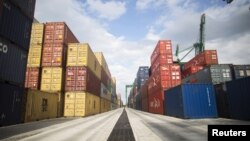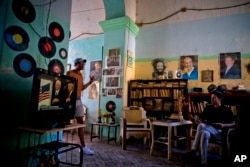A Cuban trade delegation arrived in the United States this week to visit four states and six ports, even as the Trump administration pondered what to do with a fragile detente initiated by its predecessor.
President Donald Trump has threatened to scrap the move to normalize relations between Washington and Havana, one of former President Barack Obama's signature foreign policy initiatives, if he doesn't get "a better deal."
Port authorities along the U.S. southern coast are strong proponents of increased trade and travel with Cuba, and some have expressed interest in using Mariel, on the northwest coast of the Caribbean island, as a transshipment hub.
"We're hopeful that when the Trump administration conducts a thorough review of U.S.-Cuba policy, they will see how enhanced cooperation between our port terminals and the Port of Mariel would be very beneficial to U.S. export industries [and] U.S. ports with access to Mariel's shipping lanes, and could create jobs across the country," said James Williams, president of the Engage Cuba coalition, which helped facilitate the trip.
Delegations from the ports of Houston; New Orleans; Norfolk, Virginia; and Port Everglades, Palm Beach and Tampa in Florida have already visited Mariel, often with top local and state executives.
"For states with port facilities, there is substantial political and commercial interest," said John Kavulich, president of the U.S.-Cuba Trade and Economic Council, which has followed business ties between the two countries for two decades.
"Ports are under the authorities of states, counties and cities, which means governors and mayors seeking value for their respective constituencies and seeking votes," Kavulich said.
Seeking to reverse more than 50 years of U.S. efforts to force communist Cuba to change by isolating it, Obama agreed with Cuban President Raul Castro in December 2014 to work to normalize relations. Since then, the two countries have restored diplomatic ties and signed various cooperation agreements.
Obama, a Democrat, used executive orders to circumvent the long-standing U.S. trade embargo on Cuba and ease some restrictions on travel and business. The embargo can be lifted only by the U.S. Congress, which is controlled by Republicans.
Trump, who can reverse Obama's executive orders, has threatened to end the detente if Cuba does not make further political and other concessions, although the Republican businessman-turned-politician has not specified what these should be.
The Cuban delegation, which includes top executives from the new container terminal and special development zone at Mariel and officials involved with cruise ships and investment and trade, is expected to sign nonbinding cooperation agreements with some of the ports, meet with local businesses and visit Washington on January 31.
The Cubans were in New Orleans on Wednesday, after visiting Texas earlier in the week, and will travel next to Port Everglades for a meeting with cruise line executives.
Cuba has avoided criticizing Trump since he took office Friday, and state-run media downplayed Saturday's protests against him in Washington and around the world.
Havana hotels and restaurants are full of U.S. travelers, and cruise ships now crisscross Havana Bay almost daily.
"We are all waiting. We don't know what to expect from Trump — a hit on the head or a shake of the hand," said tour guide Paulo Perez, waiting for a group of Americans at the famed Hotel Nacional in Havana.






